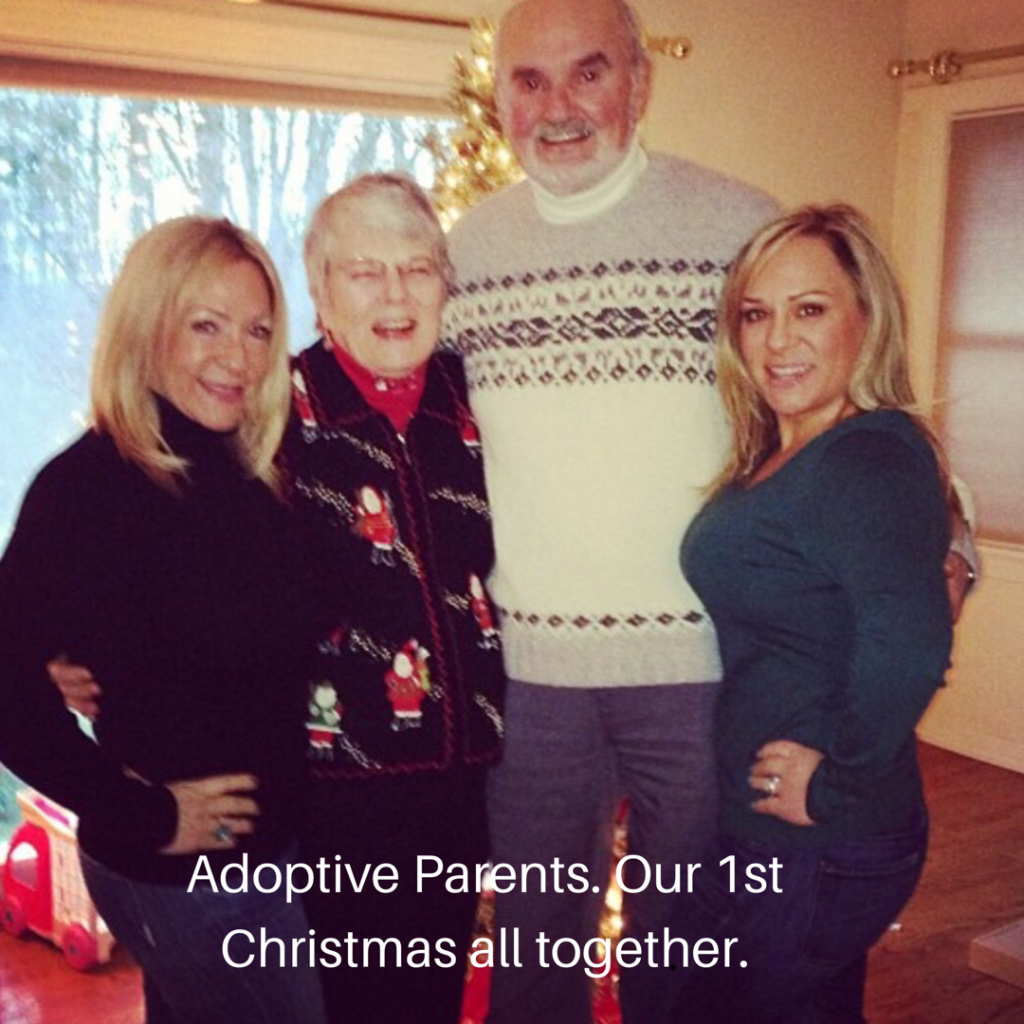Reunion With The Daughter I Relinquished For Adoption At Fifteen
When I met a former English professor in Seattle last summer, she said to me, “Why are you writing your memoir? What has caused you to take this journey?” I didn’t have an immediate answer. Initially, I’d started writing to share my story of being adopted, meeting my biological family decades later, giving up my own child for adoption when I was 15 years old, and then being reunited with her 18 years later. When I was confronted by the professor’s question, I realized my motivation for writing had changed, but I couldn’t pinpoint exactly how. I just knew that my reasons were deeper than a desire to tell my life story. I suspected it had something to do with my pain.
When I was in my early 20s, I found comfort in Johnnie Walker Black and cocaine. I told myself that I was just partying, but I was really numbing my pain. I couldn’t stop thinking about my little girl, but I never cried for her—I drank and used drugs instead. I wondered, What does Mary Monica look like? Does she have straight brown hair, and will she be short like me? Mary Monica will be starting third grade this week. Mary Monica is eight years old today. Mary Monica will blow out candles at her birthday party this afternoon. I wish I could watch her open her presents. I also wondered what would happen if she died. I was her mother, but I would never know.
I named her after myself—my full name is Mary Monica Hall. I thought it might help when she began searching for me. She was sure to receive non-identifying information containing her original name, just like the information that appeared on my own adoption order. I thought she might wonder if I’d given her my name so she could find me more easily.
She was always so close, but also just out of my reach. For almost two decades, I counted the years, months, and days till I could find her. When people asked how many children I had, she was always included in my answer. As her 18th birthday approached, I began sharing my excitement with those around me. It was then that I started getting pushback from some of my friends. “What if she doesn’t want to meet you? Maybe you should wait and see if she wants to find you first.” I was angry that they weren’t more supportive. I responded indignantly and even considered purging the doubters from my Christmas card list. “No! I know she’s just like me,” I’d say. “She’ll want to find me just as much as I want to meet her. There’s not a doubt in my mind.”
I had been sober for seven years in early 1991, and my daughter would turn 18 in six months. Waiting another half a year to begin my search felt like an eternity and I couldn’t wait, so I called the adoption agency from my office cubicle. My arm shook and my heart was pounding as I brought the phone to my ear. What if they turned me down or blocked my search? I took a deep breath and explained that I wanted to get in touch with the daughter I’d given up for adoption 17½ years earlier. I was told to wait the six months and write a letter, which they would forward to her parents. If the parents approved, the agency would facilitate a reunification. What I heard was that it was all up to her parents. They might let me meet their daughter, but only if they were open to a reunification and liked what I wrote.
While I was pregnant, the nun who organized the adoption, Sister Mary Clare, told me I could write my baby a letter that her parents would keep for her, but I never did. I knew it would mean the world to her, just as it would have for me if my birthmother had written me a letter, but what could I say? I love you and I’m sorry, but I can’t keep you because I’m only 15?Everything I thought to write sounded trite and shallow. I felt powerless. My mother even gave me an example written on notebook paper to get me started, but it, too, sounded empty. In fact, I still have it, along with the pretty pink floral stationery she bought for me to write on. I kept it in the box of keepsakes from Mary Monica’s birth, right next to the pen with which I signed the adoption papers. Sadly, I never wrote that letter. It is a regret I carry to this day.
I resigned myself to waiting another six months. Then, about four weeks later, I was at work when my phone rang. It was the adoption agency. This surprised me because I hadn’t expected a call back. I was just planning to wait for six months until I had to agonize over writing yet another letter. The woman said, “I’m sorry. We’ve been so busy that we haven’t had time to get back to you, but we have a picture here.”
I was confused. “A picture of who?” I asked.
“Of a young girl…your daughter.”
When she spoke those six words, the dam broke. I lost it.
The woman told me that she would mail the photo right away. She also explained that within a few weeks of my call, my daughter and her mother had contacted the agency to start the reunification process. My daughter later told me that she wanted to get an early start in case I was hard to find and locating me took longer than six months. Just as I expected, she couldn’t wait either. (My daughter’s need for instant gratification doesn’t fall far from the tree.) For her 18th birthday, her parents sent her out to meet me. I cannot describe the joy I felt at hearing that news. I was finally going to meet my daughter.
When the adoption agency called to tell me about the photo, I was blindsided and speechless for the first time in my life. Between the sobs and snot bubbles, I managed to get out a barely audible “thank you.” Beneath the sheet of tears, I couldn’t even see the phone to hang it up. My coworkers rushed to my cubicle wondering what was wrong and who had died.
For 18 years, I hadn’t been able to cry for my daughter. The pain was too great. I had shut it off so that I could survive. When my mom and I drove away from the hospital, after we’d said goodbye to my daughter for the last time, I looked over my shoulder at the grey-and-ocean-blue walls of Providence Hospital. I had never felt such tremendous pain and grief. Eighteen years was an eternity, and the void in my chest was more than I could bear. Out of desperation, I began repeating to myself what would become my mantra: “I just won’t think about it right now, I just won’t think about it right now, I just won’t think about it right now.”
Before the birth, I told Sister Mary Clare that my baby was going to be the only person in the whole wide world who was a part of me. Just as a sunflower reaches for the sun, I needed to see her. Sister Mary Clare kindly made arrangements for me to spend time with my baby even though other birth mothers weren’t allowed that luxury. Of course, her middle toes were long, just like mine. I fought back tears and tried to be brave during those three days that I got to hold her, count her toes, smell the innocence in her warm tiny neck, and stroke her velvety soft cheeks with the back of my finger. She cooed and smiled at me. She knew I was her mother.
On the day I expected my daughter’s picture to arrive, I rushed home from work during my lunch break. I pulled the envelope from the mailbox and settled into a chair on my sunlit porch among the baskets of pink begonias and rose bushes. My heart was pounding. I felt queasy and held my breath. I paused in reverence as I held the envelope in my trembling hand, absorbing the warm spring air and the sweet fragrance of blooming roses. I carefully took the photo from the envelope and gazed at my daughter’s full-grown face for the first time. She sat leaning to one side, posing in a professional full-length photograph taken to commemorate her high school graduation. It was the weirdest feeling. I felt like I was looking at someone familiar—someone I knew. I felt like I was looking at myself. I was flooded with relief and elation to finally see her face and was awed at how much she looked like me. It was surreal. I raced inside to call my mom and share my excitement.
After waiting for what felt like a lifetime, I finally met my daughter in person a few months later. She was close to my spitting image, same height, potty-mouth, crooked teeth and all. Like me, she grew up in a very conservative Catholic family—and like me, she is anything but conservative. Her mother once told me that she’d always thought nurture triumphed over nature—that people’s development is determined 80% by their environment and 20% by genetics. That was before all three of her adopted daughters were reunited with their birth moms. Now, she’s convinced it’s the other way around.
Initially, I thought my memoir was about my adoption stories, reunifications, and crazy years growing up in Alaska. But after writing for more than a year, I realized that I might be writing to find myself and heal my pain. If I were to write it all down and dissect every little piece of my seemingly screwed-up life, maybe I would understand why. Why what? Why all this crazy shit happened? What it all meant?
While writing my memoir, I tried to remind myself of the things I have heard over the years, like “everything happens for a reason” and “there are no mistakes.” For decades, I have had the sense that the seemingly bad things in my life were preparing me for something. I just didn’t know what. When I began writing two years ago, the call to investigate my past bordered on obsession. Once I began scraping the bottom of my memories, I couldn’t stop. I kept with it even when I considered giving up writing altogether because I questioned my sanity at dredging up so many painful experiences. Through writing it all out and investigating the torrid details, which triggered depression and weight gain, I have arrived at a place where I can forgive my younger self. My guilt and shame has been replaced with compassion and gratitude.
My daughter’s parents named her Mary Claire after the nun who handled her adoption, so she shares my first name. That tiny olive-toned baby girl has blossomed into a beautiful woman and a loving mother. She gratefully accepts the kindred relationship we have and the wisdom I am able to share. This brings my life full circle. Had I not gone through all that pain, I wouldn’t be able to experience the immense joy of knowing her and watching her life unfold. As a fifteen-year-old girl, I couldn’t have realized that my grief would lead to strength, character, and wisdom. I did give my daughter a better life, just as my birth mother thought she had done for me. Regardless —everything does happen for a reason.



